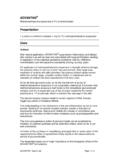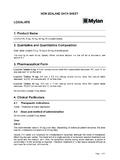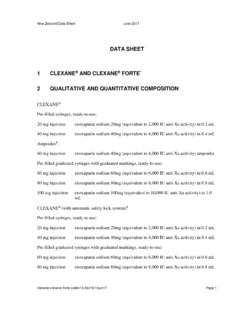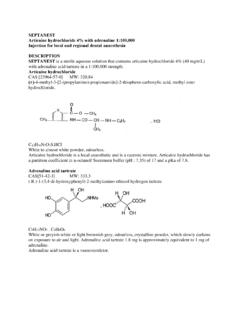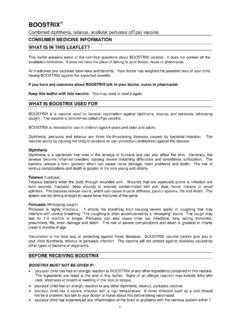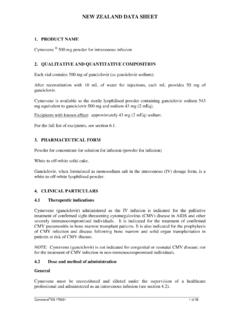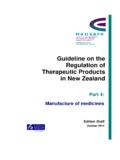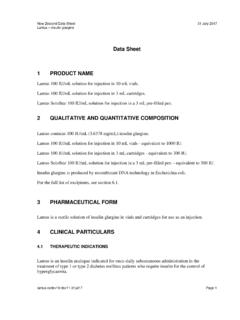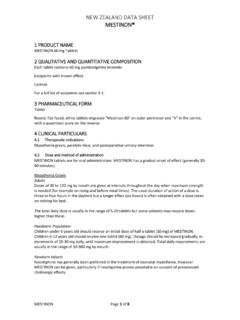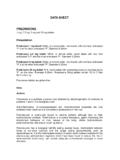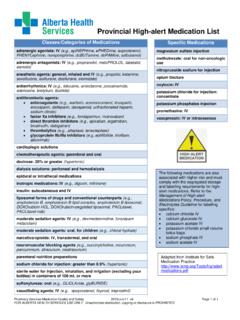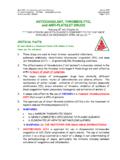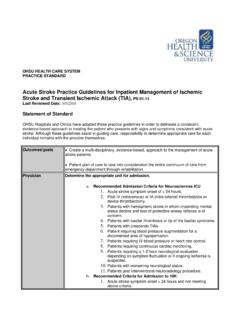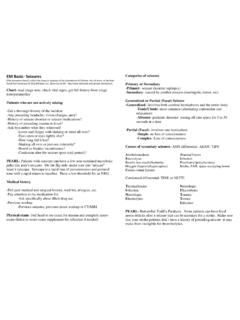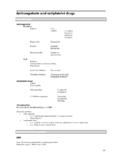Transcription of New Zealand Data Sheet APO-CLOPIDOGREL Clopidogrel ...
1 New Zealand Data SheetAPO-CLOPIDOGRELC lopidogrel bisulfate tablets 75mgPlease refer to Medsafe website ( ) for the most recent datasheetPage1of24 PresentationAPO- Clopidogrel 75mg tablets are reddish brown, round unscored film coated tablets,identified by an engraved APO on one side and CL over 75 on the other side. Each tablettypically weighs about of vascular ischaemia associated with atherothrombotic events (MI, stroke andvascular death) in patients with a history of symptomatic atherosclerotic Coronary SyndromeAPO- Clopidogrel is indicated in combination with aspirin for patients with: Unstable angina or non-ST elevation MI. Clopidogrel is indicated for early and long-term reduction of atherothrombotic events (myocardial infarction, stroke, vasculardeath and refractory ischaemia) whether or not patients undergo cardiacrevascularisation (surgical or PCI, with or without stent). ST-segment elevation acute myocardial infarction. In this population, CLOPIDOGRELhas been shown to reduce the rate of death from any cause and the rate of acombined endpoint of death, re-infarction or and AdministrationClopidogrel should be taken once a day with or without , Clopidogrel should be given as a single daily dose of 75 patients with acute coronary syndrome: unstable angina or non-ST elevation myocardial infarction - Clopidogrel treatmentshould be initiated with a single 300 mg loading dose and then continued long-term at75 mg once a day (with aspirin 75 mg-325 mg daily).
2 ST elevation acute myocardial infarction - Clopidogrel treatment should be given as asingle daily dose of 75 mg initiated with or without a 300 mg loading dose incombination with aspirin and with or without dosage adjustment is necessary for either elderly patients or patients with renalimpairment. (See Pharmacokinetics).PharmacogeneticsCYP2C1 9 poor metaboliser status is associated with diminished antiplatelet response toclopidogrel. Although a higher dose regimen in poor metabolisers increases antiplateletresponse (see PHARMACOLOGY, Pharmacogenetics), an appropriate dose regimen forthis patient population has not been established in clinical outcome trials. Consideralternative treatment or treatment strategies in patients identified as CYP2C19 bisulfate tablets 75mgPlease refer to Medsafe website ( ) for the most recent datasheetPage2of24 Children and AdolescentsSafety and efficacy in subjects below the age of 18 have not been Hypersensitivity to Clopidogrel or any of the excipients.
3 Severe liver impairment. Active pathological bleeding such as peptic ulcer and intracranial haemorrhage. Breast-feeding (see PRECAUTIONS-Pregnancy and Lactation).Warnings and PrecautionsGeneralAs with the other anti-platelet agents, Clopidogrel prolongs bleeding time and should be usedwith caution in patients who may be at risk of increased bleeding from trauma, surgery orother pathological conditions, as follows: If a patient is to undergo elective surgery and an anti-platelet effect is not desired, Clopidogrel should be discontinued at least 5 days prior to surgery. If the patient is at high risk of ophthalmic bleeding due to intraocular lesionsclopidogrel should be used with extra caution. Although Clopidogrel has shown a lower incidence of gastrointestinal bleedingcompared to aspirin in a large controlled clinical trial (CAPRIE), the medicine prolongsbleeding time and should be used with caution in patients who have lesions with apropensity to bleed.
4 (particularly gastrointestinal and onrocular) Medicines that mightinduce such lesions (such as aspirin and Non-Steroidal Anti-Inflammatory Medicines)should be used with caution in patients taking Clopidogrel . (See PRECAUTIONS-Interactions With Other Medicines). Patients should be told that it may take longer than usual for bleeding to stop whenthey take Clopidogrel (alone or in combination with aspirin), and that they shouldreport any unusual bleeding (site or duration) to their physician. Patients shouldinform physicians and dentists that they are taking Clopidogrel before any surgery isscheduled and before any new medicine is taken. In patients with recent transient ischaemic attack or stroke who are at high risk ofrecurrent ischaemic events, the combination of aspirin and Clopidogrel has beenshown to increase major bleeding. Therefore, such addition should be undertakenwith caution outside of clinical situations where the combination has proven to with Clopidogrel is limited in patients with severe renal impairment.
5 Thereforeclopidogrel should be used with caution in this is limited in patients with moderate hepatic disease who may have bleedingdiatheses. Clopidogrel should therefore be used with caution in this the CAPRIE study, it was not mandatory to discontinue study medication in the case of anacute outcome event (acute myocardial infarction, ischaemic stroke or lower extremityamputation) and the patients had a favourable outcome as compared to the aspirin bisulfate tablets 75mgPlease refer to Medsafe website ( ) for the most recent datasheetPage3of24In view of the lack of data, Clopidogrel cannot be recommended in acute ischaemic stroke(less than 7 days).Coronary Artery Bypass SurgeryWhen coronary artery bypass surgery is to be performed, Clopidogrel should be suspendedat least 5 days before surgery to reduce the risk of bleeding (see ADVERSE REACTIONS).PharmacogeneticsClopidogrel is a prodrug. Inhibition of platelet aggregation by Clopidogrel is mainly due toan active metabolite.
6 The metabolism of Clopidogrel to its active metabolite can beimpaired by genetic variations in CYP2C19 and by concomitant medications that interferewith CYP2C19. Genetic variants of other CYP450 enzymes may also affect the formationof Clopidogrel s active metabolite. In patients who are CYP2C19 poor metabolisersclopidogrel at recommended doses forms less of the active metabolite of clopidogreland has a smaller effect on platelet function. Poor metabolisers with acute coronarysyndrome or undergoing percutaneous coronary intervention treated with Clopidogrel atrecommended doses may exhibit higher cardiovascular event rates than do patients withnormal CYP2C19 function. (see PHARMACOLOGY, Pharmacogenetics and CLINICALTRIALS, Pharmacogenetics). Tests are available to identify a patient's CYP2C19genotype; these tests can be used as an aid in determining therapeutic strategy. Althougha higher dose regimen in poor metabolisers increases antiplatelet response (seePHARMACOLOGY, Pharmacogenetics), an appropriate dose regimen for this patientpopulation has not been established in clinical outcome trials.
7 Consider alternativetreatment or treatment strategies in patients identified as CYP2C19 poor metabolisers (seeDOSAGE AND ADMINISTRATION, Pharmacogenetics).HaematologicalThrombot ic Thrombocytopenic Purpura (TTP) has been reported very rarely following theuse of Clopidogrel , sometimes after a short exposure. It is characterised by thrombocytopeniaand microangiopathic haemolytic anaemia associated with either neurological findings, renaldysfunction or fever. TTP is a potentially fatal condition requiring prompt treatment, includingplasmapheresis (plasma exchange).Thrombocytopenia, neutropenia, aplastic anaemia and pancytopenia have also beenreported very rarely in patients taking Clopidogrel (see ADVERSE REACTIONS).Due to the risk of bleeding and haematological undesirable effects, blood cell countdetermination and/or other appropriate testing should be promptly considered wheneverclinical symptoms suggestive of bleeding arise during the course of treatment.
8 As with otheranti-platelet agents, Clopidogrel should be used with caution in patients who may be at risk ofincreased bleeding from trauma, surgery or other pathological conditions and in patientsreceiving treatment with aspirin, non-steroidal anti-inflammatory medicines, heparin,glycoprotein IIb/IIIa inhibitors or thrombolytics. Patients should be followed carefully for anysigns of bleeding including occult bleeding, especially during the first weeks of treatmentand/or after invasive cardiac procedures or HaemophiliaAcquired haemophilia has been reported following use of Clopidogrel . In cases of confirmedisolated activated Partial Thromboplastin Time (aPTT) prolongation with or without bleeding,APO-CLOPIDOGRELC lopidogrel bisulfate tablets 75mgPlease refer to Medsafe website ( ) for the most recent datasheetPage4of24acquired haemophilia should be considered. Patients with a confirmed diagnosis of acquiredhaemophilia should be managed and treated by specialists and Clopidogrel should among thienopyridinesPatients should be evaluated for history of hypersensitivity to another thienopyridine (such asticlopidine, prasugrel) since cross-reactivity among thienopyridines has been reported (seeADVERSE EFFECTS).
9 Thienopyridines may cause mild to severe allergic reactions such asrash, angioedema, or haematological reactions such as thrombocytopaenia andneutropaenia. Patients who had developed a previous allergic reaction and/orhaematological reaction to one thienopyridine may have an increased risk of developing thesame or another reaction to another thienopyridine. Monitoring for cross-reactivity is , mutagenicity and impairment of fertilityThere was no evidence of carcinogenic effects when Clopidogrel was given in the diet for 78weeks to mice and 104 weeks to rats at doses up to 77 mg/kg per day (representing anexposure 18 times the anticipated patient exposure, based on plasma AUC for the main circulating metabolite in elderly subjects). Clopidogrel was not genotoxic in fourin vitrotests (Ames test, DNA-repair test in rathepatocytes, gene mutation assay in Chinese hamster fibroblasts and metaphasechromosome analysis of human lymphocytes) and in onein vivotest (micronucleus test bythe oral route in mice).
10 Clopidogrel was found to have no effect on fertility of male and female rats at oral doses upto 400 mg/kg per day and was not teratogenic in rats (up to 500 mg/kg per day) and rabbits(up to 300 mg/kg per day).Use in PregnancyCategory B1 Clopidogrel and/or its metabolites are known to cross the placenta in pregnant rats andrabbits. However, teratology studies in rats and rabbits at doses up to 500 mg and 300mg/kg/day PO, respectively, revealed no evidence of embryotoxicity or teratogenicity. Thereare no adequate and well-controlled studies in pregnant women. Because animalreproduction studies are not always predictive of a human response, Clopidogrel should notbe used in women during in LactationStudies in rats have shown that Clopidogrel and/or its metabolites are excreted in breast milk(See CONTRAINDICATIONS).ADVERSE EFFECTSC linical Studies ExperienceClopidogrel has been evaluated for safety in more than 42,000 patients, including over 9,000patients treated for 1 year or more.
